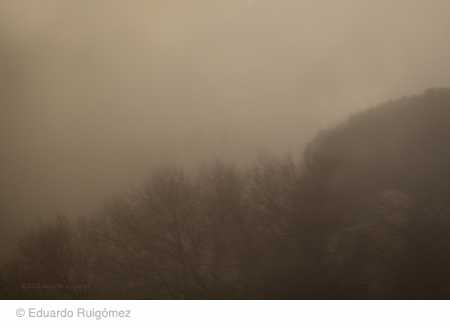Fotografía, concepto y tiempo
© Guillermo Labarca and Eduardo Ruigómez

 This is a number in which ideas are very present, specially the idea of time. The four authors confront time in different ways: Eduardo Ruigómez faces it from the utopia concept, developing an exodus trip which moves from illusion to hopelessness. For John Bulmer, who is not interested in doing art but photojournalism, time cheats him making this report become a work of art: the images of the 60s Northen England get, after the years, some universal values which transcend the moment they were takes without missing an inch of their documentary value. José Quintanilla searches of the pass of time, the memory and the beauty he notices in the field, with which he holds a very intense communication, all of this, smeared with yearning, which is the essence of evolution, as he had already revealed in a former work published in this same magazine. Felice Beato takes us to the Japan of 19th century, when the world was not still globalised and the images were little, and contributing now, one century later, to our embodiment of Japanese culture to universal history.
This is a number in which ideas are very present, specially the idea of time. The four authors confront time in different ways: Eduardo Ruigómez faces it from the utopia concept, developing an exodus trip which moves from illusion to hopelessness. For John Bulmer, who is not interested in doing art but photojournalism, time cheats him making this report become a work of art: the images of the 60s Northen England get, after the years, some universal values which transcend the moment they were takes without missing an inch of their documentary value. José Quintanilla searches of the pass of time, the memory and the beauty he notices in the field, with which he holds a very intense communication, all of this, smeared with yearning, which is the essence of evolution, as he had already revealed in a former work published in this same magazine. Felice Beato takes us to the Japan of 19th century, when the world was not still globalised and the images were little, and contributing now, one century later, to our embodiment of Japanese culture to universal history.
All the above works convey that looking is also a question of time. We don’t see same things as we did in the past, even when looking at the same photographs, and we don’t see the same in the present as we’ll see tomorrow, once the illusion is vanished.
John Berger started his book named Way of Seeing in some outright way: “To see comes before words. Children see and recognise before talking”. If we were able to see before talking, the look would be faster to choose, recognise, assume and conceptualise. We would have the ability to move forward with a look at the time that limits what occurs around us. Because we would not just see what surrounds us, but also would we immediately identify what’s going on and what it means. However, there’s one assumption that is not always fulfilled, “if we were children”….. time did already pass over us and changed even our perceptions.
Photography opens viewing spaces whenever it invites us to reveal new fields of imagination. The world leans out through our search as soon as we approach the camera’s viewer. Right away, there’s spaces that appear thanks to our fantasy. Just thinking about the pile of images that come to us in any city, a walker, a billboard, a stare, a demonstration, an argument…. the options are many. The flow is endless. We can choose and we do so. Behind this exercise, spontaneous or thought-over, we assume that we organise a space and a concept that narrow the aim that caught our attention.

